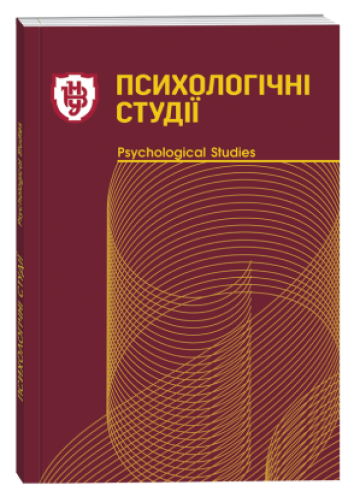FEATURES OF REFLECTIVE PSYCHOLOGICAL COUNSELING OF ADOLESCENTS IN A MODERN STRESSOUS ENVIRONMENT
DOI:
https://doi.org/10.32782/psych.studies/2023.4.9Keywords:
identity, children, psychological counseling, reflection, self-regulation.Abstract
The article deals with the features of reflexive psychological counseling of teenagers in modern conditions of a stressful environment. The concept of ‘reflection’ is interpreted from two positions: as an individual ability to build cognitive schemes of the highest order and as a way to generalize experience and ideas about the psyche and the quality of consciousness. The content and meaning of identity in adolescence are analyzed. It has been established that identity as a dynamic structure develops through crises non-linearly and unevenly, progressively or regressively throughout a person’s life. Every time there are biological or social changes in the life of a teenager, the integrative work of the Ego and the restructuring of identity elements are necessary. Since adolescence is characterized by strong physical and psychophysiological changes, psychologists should pay special attention to the formation of all types of adolescent identity. It was determined that the essential problem for a modern teenager is adaptive living of the crisis of adolescence. Therefore, the psychologist’s task in reflective counseling is to integrate the teenager’s answers to the question of who he is, what he is capable of, what his prospects are for the future, and how his future fate will develop into a holistic picture of his self-awareness. For a teenager, it is necessary to find that socially significant area in which he will act successfully identify himself in significant role models and learn responsibility. The main problems of parenting and difficulties arising at the level of family interaction are considered. In the conclusion, there are recommendations for applying cases, metaphors in myths and parables, games in psychological counseling, in which it is necessary to organize philosophical and existential reflection. The value-meaning basis of life is noted as a priority in counseling, since in adolescence, with the help of organized reflection, it is necessary to form a correct understanding of the concept of ‘reality’.
References
Алєксєєва Ю.А. Особливості психологічного консультування підлітків: тематичний план та робоча програма спецкурсу для спеціальностей «Соціальна педагогіка, практична психологія» та «Соціальна робота, практична психологія». Київ : НПУ ім. М.П. Драгоманова, 2007. 31 с.
Близнюкова О.М., Мельничук І.Я. Фасилітація як психологічний механізм формування партнерських взаємовідносин у підлітковому віці. Теоретичні і прикладні проблеми психології, 2019. № 1(48). С. 28–36.
Митник О.Я., Томаржевська І.В. Психологічне консультування: навчально-методичний посібник. Київ : Видавничий дім «Слово», 2016. 128 с.
Булах І.С., Бушай І.М., Кузьменко В.У. Консультативна психологія: підручник. Вінниця : Нілан, 2014. 484 c.
Боярин Л.В. Теоретичний аналіз вивчення проблеми соціальної адаптації у психологічній літературі. Теоретичні і прикладні проблеми психології. 2013. № 3. С. 55–61.
Опанасенко Л.А. Основи психологічного консультування: у схемах і таблицях. Миколаїв : Іліон, 2019. 134 с
Булах І.С. Психологія особистісного зростання підлітка: монографія. Київ : НПУ імені М. П. Драгоманова, 2003. С. 84–97.
Нерубаєва І.О., Павловський А.П., Шебардіна А.В. Найкращі практики роботи з підлітками : методичний посібник. Київ, 2020. 180 с.
Токарева Н.М., Шамне А.В., Макаренко Н.М. Сучасний підліток у системі психолого-педагогічного супроводу : монографія. Кривий Ріг, 2014. 312 с.
Цимбалюк І.М. Психологічне консультування та корекція. Модульно-рейтинговий курс : навчальний посібник. Київ : ВД «Професіонал», 2005. 656 с.







